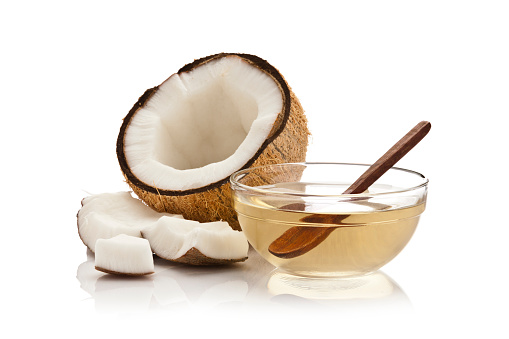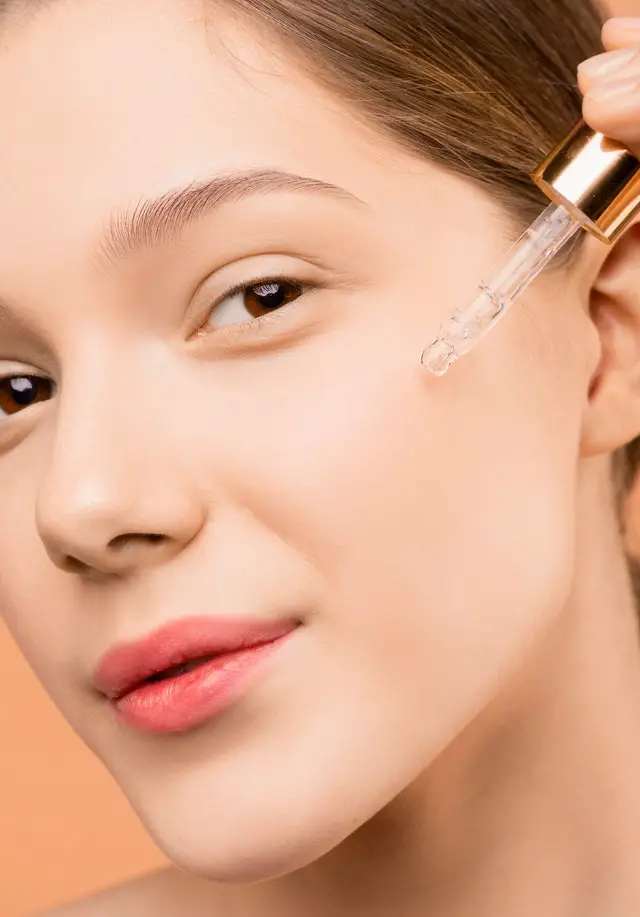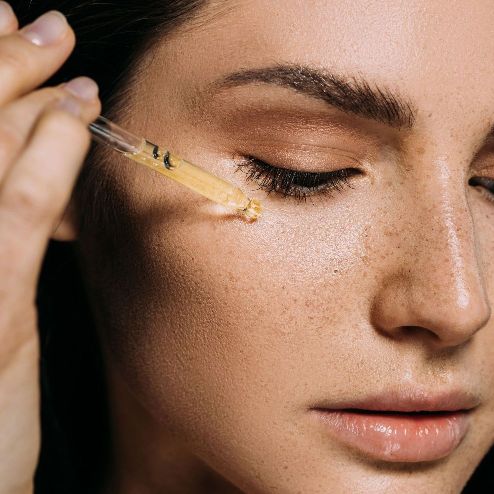
Jojoba oil has become one of the most widely used natural oils in the world, and for good reason.
This amazing oil is packed with nutrients and vitamins that help to rejuvenate the skin and eliminate wrinkles.
In fact, experts claim that jojoba oil is one of the best natural remedies for treating wrinkles on the face.
Here are eight benefits of using jojoba oil for face wrinkles + the best ways to apply and some of its precautions to consider while using it on the face.
Contents
- 1 Benefits of Using Jojoba Oil For Face Wrinkles:
- 2 How to Use Jojoba Oil for Face Wrinkles?
- 3 Precautions While Using Jojoba Oil for Face Wrinkles:
- 4 Does Jojoba Oil Increase Collagen?
- 5 How Long Does It Take Jojoba Oil to Absorb In the Skin?
- 6 Is Jojoba Oil Anti-aging?
- 7 How Often Can Use Apply Jojoba Oil to My Face?
- 8 What Are the Disadvantages of Jojoba Oil for the Skin?
- 9 Conclusion:
Benefits of Using Jojoba Oil For Face Wrinkles:
Here are the top 8 benefits of using jojoba oil for face wrinkles:
1. Packed With Nutrients:
Jojoba oil is rich in vitamin E, a powerful antioxidant that helps to protect the skin from damage caused by free radicals.
It also contains essential fatty acids, such as omega-6 and omega-9, that help to moisturize the skin and keep it healthy.
2. Non-Comedogenic:
Jojoba oil is non-comedogenic, which means that it doesn’t clog pores.
This makes it an ideal oil for people with acne-prone skin.
3. Absorbs Quickly:
Jojoba oil is easily absorbed into the skin, which means that it won’t leave an oily residue on the surface.

4. Reduces Inflammation:
Jojoba oil has anti-inflammatory properties that help to reduce redness and inflammation in the skin.
This makes it an ideal oil for people with sensitive skin.
5. Promotes Collagen Production:
The vitamin E in jojoba oil helps to promote collagen production, which is essential for keeping the skin firm and youthful.
6. Provides UV Protection:
Jojoba oil contains natural sunscreen properties that protect the skin from harmful UV rays.
7. Reduces the Appearance of Fine Lines:
Jojoba oil has moisturizing and nourishing properties that help to reduce the appearance of fine lines and wrinkles.
8. Suitable for All Skin Types:
Jojoba oil is gentle and non-irritating, making it suitable for all skin types, including sensitive skin.
How to Use Jojoba Oil for Face Wrinkles?
To get the most out of using jojoba oil for face wrinkles, it’s important to know how to properly use it.
- Start by cleansing your face with a gentle cleanser so that your pores are open and ready for treatment.
- Then apply 1-2 drops of jojoba oil on your fingers, and rub them together to warm up the oil before applying it on your face.
- Gently massage the jojoba oil into your skin until fully absorbed into your pores.
- You can then apply a moisturizer or facial mask if desired.
For best results, use jojoba oil regularly 2-3 times per week at night before bedtime after cleansing your face thoroughly with a hydrating cleanser or scrub.
Precautions While Using Jojoba Oil for Face Wrinkles:
Before using any type of new product on your face—especially one made with natural ingredients—it’s important to do a patch test first just in case you have an allergic reaction or sensitivity to any ingredient contained in the product itself.
Additionally, be aware that some people may experience irritation when using too much jojoba oil on their face so start with just one drop at first until you get used to it before increasing usage over time if needed.
Does Jojoba Oil Increase Collagen?
Yes, jojoba oil can help to increase collagen production in the skin. This is due to its high content of vitamin E which helps support the skin’s natural collagen production.
Additionally, jojoba oil helps to reduce inflammation and hydrate the skin for a more youthful appearance.
How Long Does It Take Jojoba Oil to Absorb In the Skin?
Jojoba oil absorbs quickly into the skin, usually within a few minutes.
This makes it an ideal choice for people who want quick results without having to wait for hours or days before seeing visible changes in the appearance of their skin.
Is Jojoba Oil Anti-aging?
Yes, jojoba oil is an effective anti-aging treatment due to its ability to hydrate and soothe the skin while also helping to reduce inflammation.
It can also help increase collagen production in the skin, which helps promote a more youthful appearance.
Additionally, it can help protect against sun damage and reduce the appearance of fine lines and wrinkles.
When used regularly, jojoba oil can help to keep skin looking youthful and healthy.
How Often Can Use Apply Jojoba Oil to My Face?
It’s safe to apply jojoba oil on your face 2-3 times per week.
Depending on your skin type and any existing skin conditions, you may need to adjust the frequency at which you apply jojoba oil.
It’s also important to always follow up with a moisturizer or facial mask after applying jojoba oil to get the best results.
Using jojoba oil regularly can help reduce the appearance of wrinkles and give your skin a more youthful look over time. The key is to be consistent with your routine and follow the instructions for proper use.
What Are the Disadvantages of Jojoba Oil for the Skin?
Jojoba oil has become a popular ingredient in many skin care products due to its moisturizing and anti-inflammatory properties.
But despite its popularity, there are a few potential drawbacks to using jojoba oil on your skin that you should be aware of.
Let’s explore these disadvantages in more detail.
1. Allergic Reactions
One of the primary disadvantages of jojoba oil is that it can cause an allergic reaction in some people.
Allergic reactions occur when your body’s immune system overreacts to a substance it perceives as foreign, such as jojoba oil or other ingredients used in many skin care products.
Common symptoms of an allergic reaction include itching, redness, swelling, and hives. If you have sensitive skin, consult your dermatologist before using any product containing jojoba oil.
2. Clogged Pores
While jojoba oil is great for moisturizing dry skin, it can also clog pores if used too often or in large quantities.
This can lead to acne breakouts and other types of skin irritation. It’s important to use only a small amount of jojoba oil and to avoid applying it directly onto oily areas of the face such as the forehead or nose.
Additionally, make sure to cleanse your face regularly with a gentle cleanser and lukewarm water so that clogged pores don’t become a problem for you.
3. Expense
Another disadvantage of jojoba oil is that it can be expensive compared to other types of oils commonly used in skin care products such as coconut or almond oils.
Depending on the brand and quality, prices can range anywhere from $10-$50 per bottle which may be cost-prohibitive for some people looking to incorporate this ingredient into their skincare routine on a regular basis.
Conclusion:
Using jojoba oil for face wrinkles is an effective way to reduce their appearance while also providing deep hydration and nourishment for aging skin cells without clogging pores or causing irritation due to its natural properties similar to our own sebum production process.
Just remember always to perform a patch test first before using any new products on your face and stick with only 1-2 drops at most for each application until you’re comfortable increasing usage over time if needed!
In conclusion, jojoba oil is a highly effective and natural remedy for treating facial wrinkles. Its many benefits make it an ideal choice for anyone who wants to keep their skin healthy, youthful, and glowing. So why not give it a try and see the results for yourself?
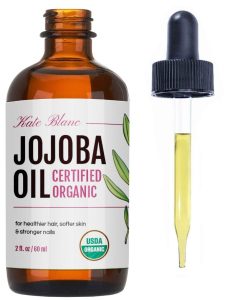
![30 Best Jojoba Oil Shampoo [Reviewed] 30 Best Jojoba Oil Shampoo [Reviewed]](https://theoilvirtue.com/wp-content/uploads/2022/02/J·R·LIGGETTS-All-Natural-Shampoo-Bar-Jojoba-And-Peppermint-300x300.jpg)
![15 Best Jojoba Oil Body Oil [Reviewed] 15 Best Jojoba Oil Body Oil [Reviewed]](https://theoilvirtue.com/wp-content/uploads/2022/02/Jojoba-Oil-By-Leven-Rose-Pure-Cold-Pressed-Organic-Unrefined-Moisturizer-For-Skin-Hair-Body-Nails-And-Cuticles-300x300.jpg)
![20 Best Jojoba Oil Shave Oil [Reviewed] 20 Best Jojoba Oil Shave Oil [Reviewed]](https://theoilvirtue.com/wp-content/uploads/2022/02/The-Man-Company-100-Natural-Beard-Oil-For-Men-With-Almond-Oil-Thyme-Argan-And-Jojoba-Oil-300x300.jpg)

![12 Best Jojoba Carrier Oils [REVIEWED] 12 Best Jojoba Carrier Oils [REVIEWED]](https://theoilvirtue.com/wp-content/uploads/2022/02/Cliganic-USDA-Organic-Jojoba-Oil-100-Pure-Natural-Cold-Pressed-Unrefined-Hexane-Free-Oil-For-Hair-Face-Base-Carrier-Oil-244x300.jpg)

![10 Best Jojoba Oil Gallon [Reviewed] 10 Best Jojoba Oil Gallon [Reviewed]](https://theoilvirtue.com/wp-content/uploads/2022/02/Cliganic-Jojoba-Oil-Non-GMO-Bulk-Gallon-128oz-100-Pure-Natural-Cold-Pressed-Unrefined-Hexane-Free-Oil-For-Hair-Face-167x300.jpg)
![15 Best Jojoba Oil Hair Oil [REVIEWED] 15 Best Jojoba Oil Hair Oil [REVIEWED]](https://theoilvirtue.com/wp-content/uploads/2022/02/Cliganic-USDA-Organic-Jojoba-Oil-100-Pure-Natural-Cold-Pressed-Unrefined-Hexane-Free-Oil-For-Hair-Face-243x300.jpg)


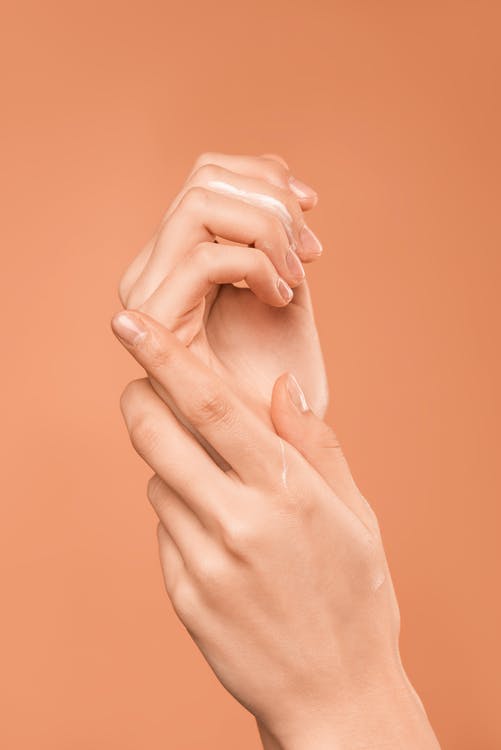

![18 Best Jojoba Oil Soap [Reviewed] 18 Best Jojoba Oil Soap [Reviewed]](https://theoilvirtue.com/wp-content/uploads/2022/02/Cove-Castile-Soap-Unscented-Organic-Argan-Jojoba-And-Hemp-Oils-228x300.jpg)
